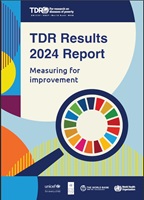About us
The Joint Coordinating Board (JCB) is the top governing body of TDR. Its principal role is to coordinate the interests and responsibilities of all parties collaborating with the Programme. The JCB meets annually to review TDR’s activities, evaluate progress and plans, and determine the budget. The first session of the JCB took place in 1978.
Composition and membership
The JCB shall consist of 28 members from among the Cooperating Parties:
- Twelve representatives from the governments contributing to the Special Programme Resources, selected by the contributors to the Special Programme. Each such government representative shall serve as representative of his/her government and may also serve as representative of a constituency established by governments under this membership category. Each constituency will develop its own procedure to designate its representative to the Board. In the event a government intends to serve on the Board also as representative of a constituency, it shall indicate this in its application for membership, it being understood that each government participating in that constituency shall be entitled to rotate as the representative of that constituency at any session of the JCB.
- Six government representatives selected by the WHO Regional Committees from among those countries directly affected by the diseases dealt with by the Special Programme, or from among those providing technical or scientific support to the Special Programme.
- Six members, designated by the JCB itself, from among the remaining Cooperating Parties.
- The four Agencies which comprise the Standing Committee.
Members of the JCB shall serve for a period of four years and may be reappointed.
Operation
The JCB convenes in annual sessions and, if necessary, in extraordinary sessions, provided that a majority of the members agree to do so. During these meetings, the JCB elects a Chair and a Vice-Chair from among the representatives of its members. The Chair is elected every three years, while the Vice-Chair is elected every two years. Both officers continue to serve until their successors are chosen.
Should the Cooperating Party represented by the Chair cease to be a member of the JCB, or if the individual holding the position of Chair is no longer a representative of that member, the chairpersonship concludes before the standard term expires. In the event of such a vacancy, the Vice-Chair assumes the responsibilities of Chair until a new Chair is elected at the next session of the Board.
The Chair presides over JCB sessions and, in their absence, the Vice-Chair fulfills this role. Between sessions, the Chair and Vice-Chair undertake additional duties as assigned by the JCB.
The World Health Organization (WHO), serving as the Executing Agency for the Special Programme, provides the Secretariat and supporting services and facilities necessary for the functioning of the JCB.
Chair and Vice-Chair
Dr Dirk Mueller (United Kingdom of Great Britain and Northern Ireland)
Chair
Dr Iris Cazali (Guatemala)
Vice-chair
Former JCB Chairs and Vice-Chairs (past 10 years)
Chairs:
Dr Sunil De Alwis (Sri Lanka), 2024–2025
Dr Vic Arendt (Luxembourg), 2020–2023
Dr Modest Mulenga (Zambia), 2017–2019
Professor Hannah Akuffo (Sweden), 2014–2016
Vice-Chairs:
Dr Daniel Eibach (Germany), 2024–2025
Dr Tahir bin Aris (Malaysia), 2021–2023
Dr Xiao Ning (China), 2019–2020
Dr Vic Arendt (Luxembourg), 2017–2018
Dr Shahnaz Murad (Malaysia), 2015–2016
Featured publications

TDR results 2024 report
The 2024 results report marks the first year of measuring TDR’s performance based on the revised performance framework in which indicators have been...
TDR annual report 2024
This report highlights the impact of research supported by the UNICEF/UNDP/World Bank/WHO Special Programme for Research and Training in Tropical Diseases...
TDR performance framework (2024-2029)
This revision of TDR’s performance framework aligns with the 2024–2029 strategy and its objectives, while building on lessons learned from...
TDR results 2023 report
The TDR results report is produced by its secretariat every year to document the progression on indicators related to three overarching categories: technical...
TDR annual report 2023
This report highlights the impact of research supported by the UNICEF/UNDP/World Bank/WHO Special Programme for Research and Training in Tropical Diseases...
TDR Strategy 2024-2029
For almost 50 years, TDR has been a leader in research to address infectious diseases of poverty and in building the capacity of people, communities and...

